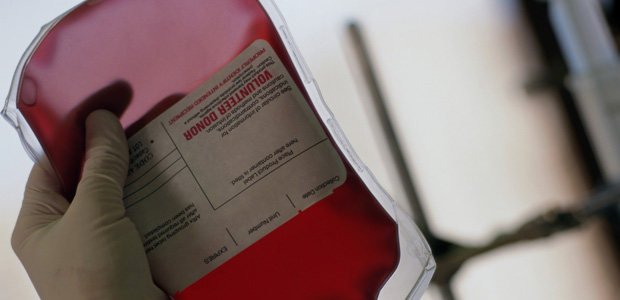Advertisement
Transfusions
Blood has become one of the most scrutinized fluids of our time. Canada’s tainted blood scandal left thousands of people infected with hepatitis C and shook public confidence in the Canadian Red Cross. Yet there is more information threatening to rock the medical establishment and causing people to demand safer alternatives. About one in 20 … Continued

Blood has become one of the most scrutinized fluids of our time. Canada’s tainted blood scandal left thousands of people infected with hepatitis C and shook public confidence in the Canadian Red Cross. Yet there is more information threatening to rock the medical establishment and causing people to demand safer alternatives.
About one in 20 Canadians will require a blood transfusion during his or her life. Currently, Canada has a four-day supply of blood on hand, which often forces us to purchase blood from countries with less stringent screening procedures than our own.
When people have surgery, the surgical procedure is often explained in detail, but any risks associated with the blood transfusion are rarely, if ever, discussed. Patients are led to believe that blood transfusions are innocuous and have little risk. Some religious groups have always avoided blood and blood products. They now have the backing of scientists and doctors who support their convictions. Bloodless hospitals that specialize in bloodless surgery are becoming more common, with over 60 hospitals and 10,000 doctors specializing in bloodless surgery throughout North America.
A Gallup poll conducted in February 1996 found that 89 percent of Canadians would prefer an alternative to donor blood.
Not As Safe As We Think
Blood transfusions are themselves immunosuppressive. Hemophiliacs suffer from immunosuppression caused by long-term transfusions of blood products. Half of all blood recipients die within the first year after transmission. [Half of those that die would have survived without a transfusion.] Naturally, this risk does not apply to all patients. The very old, very young and most severely injured are the most affected. These patients have undergone traumatic medical problems and require blood transfusions in an effort to replace fluids after risky surgery.
In the case of an organ transplant, the patient is given drugs designed specifically to suppress the immune system, thereby reducing the possibility of organ rejection. But the blood itself is foreign material. It overloads an already-stressed immune system and makes way for opportunistic infections that prey on weakened individuals.
The aftermath of AIDS and hepatitis has resulted in much greater awareness of blood transfusion risks. It is important for patients to realize that under Canadian law they have the legal right (except in an emergency) not to have a transfusion without their consent. That includes the right to be fully informed of the alternatives.
Patients have the right to be informed, even if the risk is marginal, that treatment might result in paralysis or death. Many provinces have passed specific legislation directed to obtaining consent to medical procedures.
Reduce Blood Use
Surgery has changed considerably to decrease bleeding. The surgical tools used are increasingly complex. They include scalpels that are heated to cauterize wounds or which emit high-frequency vibrations or beams of argon gas that stimulate coagulation. Surgeons must be retrained in gentle tissue handling, precise dissection and use of equipment and techniques that help staunch bleeding, from clamping of blood vessels through to the high-tech lasers.
In recent years, surgical techniques have improved to the point where the cuts are barely visible or even unnecessary. Endoscopes, slender tube-like instruments, can be inserted into orifices like the throat. They allow physicians to examine places inside the body without resorting to exploratory surgery. Highly complex procedures such as brain surgery, liver tumor removal, prostate, vascular, gynecological and gastrointestinal surgery have all been successfully performed without blood transfusions.
Herbal Booster
If you find yourself in a situation where a blood transfusion is absolutely necessary, you must reduce your chances of becoming ill. Ideally you should begin two weeks before your blood transfusion. After the surgery, make use of liquid iron supplements, which will help provide easily absorbable iron and B-vitamins to build healthy blood cells. You should take 10 millilitres per day for up to one month after your surgery. Take 3,000 milligrams of vitamin C. This aids the absorption of iron and promotes immune function, thereby strengthening your resistance to infection.
A herbal tea consisting of nettles, alfalfa, echinacea, yellow dock and marigold provides a rich source of nutrients, including iron, calcium, magnesium and vitamins D, K and E, in addition to antiseptic actions that protect the body from viral, bacterial or fungal infections. To maximize benefits, drink three cups per day.
Illness is scary, so educate yourself. Ask your doctor about the choices and alternatives to blood transfusions that are available to you. Ensure that you are fully aware of all the risks involved. Can your doctor perform bloodless surgery? If not, consider a referral to a doctor who can. Keep in mind that it is up to you to take charge of your health. You must dictate what will be done to your body.




